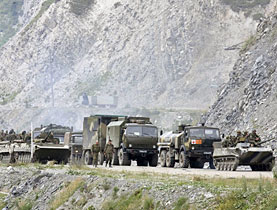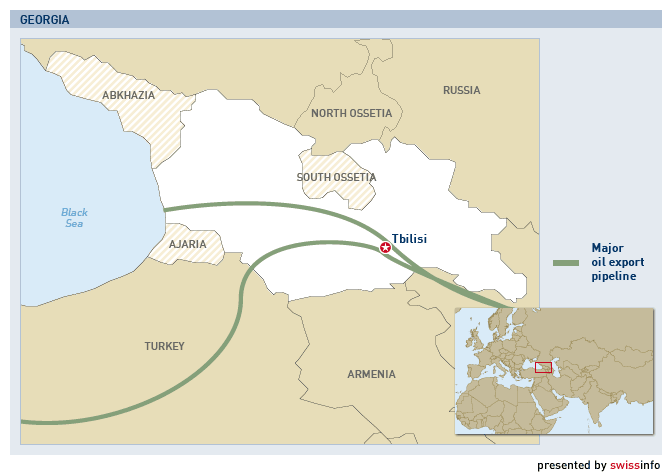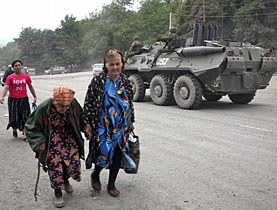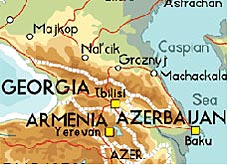Clash of identities triggered Caucasus crisis

The outbreak of conflict in the Caucasus region has thrown a sudden spotlight on an area and people little known in the West.
Swiss regional expert Eric Hoesli explains to swissinfo the background to the fighting, in which Georgia attempted to clamp down on its breakaway province of South Ossetia, provoking a strong Russian military reaction in support of the rebels.
On Monday Russian troops entered the territory of Georgia proper, and have remained in the positions they captured although they halted their advance on Tuesday.
Georgia’s western allies are attempting to broker a peace agreement. French President Nicolas Sarkozy, visited Moscow and the Georgian capital Tbilisi on Tuesday. France holds the current presidency of the European Union.
US President George W. Bush has condemned what he called Russia’s “invasion”.
South Ossetia, populated by ethnic Ossetians, has been de facto independent of Georgia since 1990. (See Key Facts)
swissinfo: Why should the Ossetians get help from Russia? What is the relationship between them?
Eric Hoesli: The Ossetians have traditionally been faithful allies of the Russians, their great northern neighbour and major market. They have long been linked economically, intellectually and politically with Russia.
swissinfo: What about with Georgia?
E.H.: They have also historically been close to the Georgians. Ossetians controlled the main pass over the Caucasus and they subsequently spread all over the southern flank of the mountains. They have a long history of co-existence with the Georgians.
After the collapse of the Soviet Union the [Ossetian and Abkhaz] minorities found themselves faced with a Georgia thirsting to find its own identity, to demonstrate that Georgia was a single entity, a single people, and single language. At the time of independence Georgia was led by a hardline nationalist leader who simply did away with the autonomous status enjoyed by the minorities during Soviet times and wanted to turn them into ordinary Georgian administrative regions.
So two types of nationalisms came into conflict. On the one hand the perfectly understandable nationalism of the Georgians after they got rid of Soviet tutelage, and on the other the nationalism of the minorities, who are quite unrelated to the Georgians, and who under the system of autonomy could always appeal to Moscow against the Georgians, but who now were suddenly left with nothing.
swissinfo: But hasn’t Georgia recently tried to give more autonomy and improve the situation of these peoples?
E.H.: It’s true that in recent years the Georgians have gone a long way in granting concessions [to Abkhazia and South Ossetia] But I think there are two factors which have prevented progress in this direction. In the first place Russia has given immediate and large-scale aid. For example, the Russians have built a gas pipeline through the mountains to supply the Ossetians. They have made major investments. But it’s also clear that the Russians have tried to use the conflict for their own ends to win the support of the Ossetians. And they’ve been successful with a large number of people.
The second problem is that even if the Georgians have made a lot of promises, their minorities policy leaves a lot to be desired.
swissinfo: Is Georgian President Mikhail Saakashvili using the situation to boost his own popularity?
E.H.: He probably had several considerations. One was that if things turned out badly and the Russians intervened – as we have seen that they did – this would be proof that Georgia cannot defend itself against Russian pressure, and that Nato is the only body to which Georgia can turn for help. Of course he is risking an own goal, in that he is demonstrating that the current Georgian government is not a reliable partner since it took an enormous risk by provoking Russian intervention.
The status quo is to Georgia’s disadvantage. South Ossetia has been self-ruling with de facto independence for about 15 years now.
swissinfo: What interests does the West have in the region?
E.H.: There are several major things at stake. In the first place Georgia is on the border of Russia and very close to Iran and also has a border with Turkey. For the United States in particular Georgia’s proximity to Russia and Iran makes it an important place.
Then Georgia is in the east-west corridor running alongside Russia, along which energy products can pass without going through Russia. The Europeans have repeatedly proposed making this into a transport corridor too, for both road and rail.
There is also the aspect of shared values. Since becoming independent Georgia has aspired not just to economic integration with the West but also cultural and political integration. They would like to apply for European Union membership, they want to join Nato.
I would say that Russia’s main aim in the conflict with Georgia is to stop it joining Nato. For Georgians I would say there are two main challenges: the first is to recover its territorial integrity, and the second to see whether this can be achieved in parallel to Nato membership, without Russian support.
swissinfo: What role can Switzerland play here?
E.H.: Switzerland has been quite active in Georgia since independence. The Swiss Agency for Development and Cooperation has quite a lot of people working in the region.
We have a lot of things in common with the Georgians too: we are both mountain peoples, without many natural resources, and we are both multi-national states. So all of that creates a bond with the Georgians.
But Switzerland does not have much room for manoeuvre. And its precipitation in recognising the independence of Kosovo [from Serbia] means that it is not really in a position to play much of a role.
swissinfo-interview: Julia Slater
The Ossetians are descended from the nomadic Scythian people.
They live on either side of the Caucasus mountain range, controlling the main pass. This is why Ossetia is divided into two parts. North Ossetia is part of the Russian Federation, while South Ossetia is part of Georgia.
South Ossetia has had de facto autonomy from Georgia since the 1990s and the break-up of the Soviet Union. In Soviet times, the minorities in the Caucasus had a certain amount of autonomy as far as their language and culture was concerned.
When Georgia became independent in 1991, its hardline nationalist president tried to clamp down on the autonomy of the Ossetian, Abkhaz and Ajari minorities.
Like South Ossetia, most of Abkhazia is currently de facto self-governing. However, Georgia managed to reimpose its authority in Ajaria in 1994 after ousting its authoritarian ruler.
The conflict began in South Ossetia on Thursday when Georgia tried to regain control of the breakaway region, prompting a strong Russian military response.
Bombing raids have displaced thousands of people on both sides of the border. The number killed is unclear.
Aid is being sent to the region and the world’s seven largest economic powers urged Russia on Monday to accept an immediate cease-fire with Georgia and agree to mediation.
The UN Security Council held a fifth emergency session on Georgia on Monday, continuing attempts to agree on the wording of a unanimous appeal for a cease-fire.
French President Nicolas Sarkozy was visiting Russia and Georgia on Tuesday to try to promote a peaceful settlement. A senior US diplomat is also in Tbilisi working with Georgian and European officials.
Hoesli was born in 1957 in the French-speaking canton of Vaud. He studied law at Lausanne University, with post-graduate studies on development in Geneva and has worked for various French language Swiss newspapers. He is currently regional director of the regional press of the Lausanne-based Edipresse group.
Hoesli has visited Russia several times, including covering the war in Chechnya. He published a study of the geopolitics of the Caucasus in 2006, entitled A la conquête du Caucase (Conquering the Caucasus).


In compliance with the JTI standards
More: SWI swissinfo.ch certified by the Journalism Trust Initiative



You can find an overview of ongoing debates with our journalists here. Please join us!
If you want to start a conversation about a topic raised in this article or want to report factual errors, email us at english@swissinfo.ch.